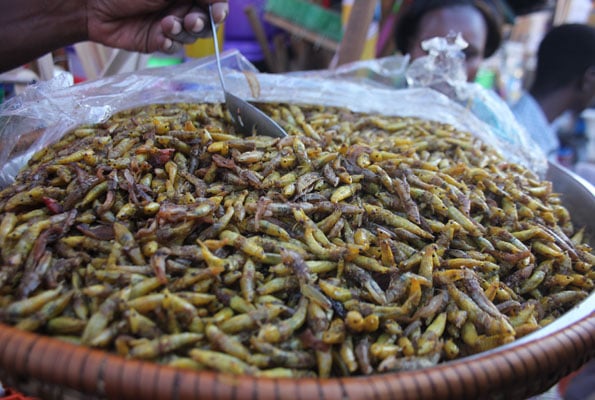Prime
Health benefits of eating grasshoppers

Grasshoppers are rich in fats and can be eaten as part of a main dish. PHOTO/ABUBAKER LUBOWA
What you need to know:
- Grasshoppers are among the most antioxidant-rich insects and contain five times more antioxidants than fresh orange juice. Here is why you may want to include them as part of a disease-fighting diet.
Globally, about two billion people in Africa, Asia and Latin America eat insects. There are more than 2,000 species of edible insects which include bees, wasps, ants, locusts, grasshoppers, caterpillars and beetles, among others.
Commonly known as nsenene, grasshoppers are a delicacy for many people in Uganda. They are also popular snacks in parts of Mexico and Central America.
They are usually in season during the rainy months of May and November but some people have come up with ways of rearing and supplying them throughout the year.
During the peak seasons, many pick-ups and public service vehicles are seen transporting them to city centres where they are sold. The process of preparing them starts by plucking off the wings and the legs and according to Webmd, “You should remove their feet before eating them. This is because grasshoppers have large spines on their shin bones and these could get caught in your gut, causing blockage in your intestine and the need for surgery.”
After this, they are washed thoroughly and put in a saucepan. You can add chopped onions, green paper, chilli and salt to taste then put on moderate heat and fry. The longer you cook them for, the crunchier they become. You do not need to add cooking oil since they are already fatty enough. They can also be boiled with a little salt and sun-dried.
Vitamins and minerals
According to Ivan Philip Baguma, a nutritionist, grasshoppers are loaded with vitamins and minerals such as iron and zinc, calcium, magnesium and manganese. They are also rich sources of antioxidants, protein and fatty acids that help in lowering bad cholesterol
Grasshoppers have high amounts of dietary fibre that aids bowel movements. They also contain a higher protein content than many other animal and plant sources such as chicken, eggs and beans and are also rich sources of carbohydrates.
Grasshoppers have a high content of unsaturated fat that is also found in avocado and flax seeds. Research shows that unsaturated fats can improve your blood cholesterol levels and ease inflammation.
The United Nations encourages more people to eat insects not only because they are nutritious and healthy meat alternatives, but also because they produce fewer greenhouse gases than most livestock.
Caution
Sometimes, people report negative effects after eating grasshoppers. However, Baguma says, this is usually as a result of poor hygiene. Also, he says, some people might have allergic reactions to some proteins that might be found in the grasshoppers.
“The roadside sellers sometimes do not wash the grasshoppers thoroughly or sometimes, the grasshoppers stay for so long before they are consumed so the seller keeps adding fresh ones which may cause contamination with germs,” he says.
To ensure good hygiene, Baguma advises one to buy grasshoppers from a trusted source or buying them fresh and preparing them yourself.
He adds that these edible insects have high concentrations of chemicals from pesticides, espcially if harvested from gardens. This may be harmful if you eat too may, often.



